Oral Testimony of NIYONGIRA Diane
Search
Table of contents
- Pre-Genocide
- Introduction
- Family life
- Genocide experience
- Shorongi sector experience
- Death of neighbors
- Arrival of the Inkotanyi soldiers
- Death of my family
- The Interahamwe looting in house
- Shyorongi Hospital experience
- Liberation by Inkotanyi soldiers
- Post-Genocide
- Emmotions and hardships
View Topics
- Political parties and meeting
- Killings
- Attack at home
- Deportation and raping
- Death of my family
- Bombing
- Death of my mather
- Torture
- Liberation
- Adoption
- Emotion and hardships
- My strategies
- My message
View People
- Niyongira Diane
- Butare Charles)
- Mukamunana Agnes
- Habyarimana
- Kayitare Emmanuel
- Mukankusi Denise and Mukabutatare Merveille
- Mbarushimana Emile Pierrot
View of Places
- Shyorongi (Kigali Rural)
- Kakiru minister
- Shyorongi sector
- Shyorongi hospital
- Kabwayi hospital
- Butare
- Ririma sector
- Gatsata
- Remera
- Nyamata district
- Kimironko
- Ririma secondary school
View Map
View English translation
- Diane : My name is Niyongira Diane; I am 19 years old. My father was called Butare Charles; my mother was called Mukamunana Agnes. Diane We lived in Shyorongo in Kigali Ngali. My mother was a teacher and my father worked at Kacyiru at the ministry. ome children passed near the fence. I called them because I was thirsty. I asked them to get me some water to drink, they said;
- Diane : It was at night when our father told us that Habyarimana [the former president of Rwanda] had died. But before Habyarimana' s death, there were several political organizations and whenever meetings were held, we would run away from our home because they wanted to kill my father.
- Diane : When the war began they immediately surrounded Shyorongi [the place where we lived] so that no one could run away. After a few days we were informed that Interahamwe [the perpetrators] were coming so we should move from our houses and go to another sector for our security. Of course that was a very easy way of killing us.
- So many people went there, but my father sensed the danger, he said that instead of being killed at that sector let them come and kill us from our home. We stayed there [at home], we would spend the day at home but at night, we would hide in banana plantations. Those who had gone to the sectors, were told to move from there, and were taken to the bush, they were convinced that they would be safer there
- Diane : When they reached there, some of them were shot, others were bombed, a very few people escaped and among those there was a child who was our neighbor. He came back and told us that they had killed his whole family. He then stayed with us. The perpetrators could come mixed with soldiers to search for [R.P.F.] Rwandan Patriotic Front army members that could be hiding in homes. At first they came looking for them but they did not find them and they came for the second time searching everywhere even in the ceiling, but they could not find them.
- Diane : One night, they came and took my mum and my two sisters to kill them. As they were almost going, my mum asked them to hold on and give her a chance to say something. Then they asked her if she was going to say "bye". She asked them if she could carry her baby. [She had a baby]. Therefore, they said, " if you have a baby you can stay, we will take the two girls" [my sisters]. They took my sisters where they [the perpetrators] were meant to kill them. And when they reached there [because they were searching for other people to kill], they told one of the Interahamwe to take my sister and kill her, but that Interahamwe told my sister he wasn't going to kill her, he told her to go and die in other people's hands. She came back home. The other sister went with those perpetrators to a place where they were looking for a boy they wanted to kill. When reached that boy's home, they told her to go and knock on his door so that they could kill them together. She went and knocked, but the boy ignored and refused to open the door then they told her to get out of the way so that they could knock for themselves. They wanted to break down the door.
- Diane : They knocked and then one of them who was behind asked my sister if she could come with him so that he could save her life. She refused and said, "If you want to go and kill me where people won't be able to see me just kill me here where they will see my body." That man insisted saying that he wanted to hide her not to kill her. She finally accepted. As the other ones were still struggling to get the boy out of the house, he took her to his home. After some days, when we thought she had died, that perpetrator came to the house and told my father to give him money so that he would give him his daughter back. My father asked him "honestly do you think I work with what is taking place? Are you just making fun of me while I know very well that you killed my daughter?" The man said," I have your daughter and the only thing I need is money, then I will give her back to you." Later my father gave him money and he brought her the following day. Then days went by and they [the perpetrators] came again. Other attackers together with soldiers surrounded our place at eleven o'clock in the morning. My father, my mother, my young brother and I went to hide behind the house and the other children went to the house and locked themselves in. Then when the attackers surrounded the whole place, they threw a bomb. Just before, my father had told my younger brother and me to lay down so that the bomb would not kill us.
- Diane : We were lying behind the house the moment they dropped the bomb, it passed through the window and fell in front of me. The explosion hit me on the head near the ear, on my arm and my leg. I was really injured and then my mother lifted me and took me besides the house and asked me to be strong, she thought I was going to die. After the explosion, they immediately entered and got my brother and killed him. They also saw my mother holding me, and they called her, but my mother had been the teacher of one of them though he was grown up now. That same person called my mother, she came and asked him, "Why do you want to kill me, have I done anything wrong?" He just kept quiet and shot her. She fell down and died.
- Diane : I sat there watching but I could not move. Then they saw my father as he was going to hide my young brother in the kitchen, after he had hidden him, he [my father] tried to jump over the fence and when he jumped, they got him and beat him to death. And when I saw that my father had jumped I also wanted to stand up and run because the wounds were not yet so painful. I stood up and the moment I tried to climb up, I fell down but fortunately I climbed a little bit and fell behind the fence. I went to the gardens and hid in a sorghum plantation and stayed there.
- Diane : Then they got my younger brother and they were going to kill him, but he escaped. They tried to shoot him but the bullets were passing over his head. Then they got my older sister who had remained and killed her, my two older sisters and my little baby brother remained. They shot the baby in the eye and left him crying. Then one of those men said that he was going to take one of my older sisters [the first-born in our family]. They would not kill her so that he [the perpetrator] could get a wife for free
- Diane : He took her and as they reached the road, they met other attackers. The other attackers got her from him and killed her. There remained only one sister and the baby boy before it died. Then they told her [my sister] to show them the Nkotanyi [RPF troops] that are in our house, but she told them that there were no soldiers there. They started hitting her with a gun so that she would show them where the soldiers were hiding and she would keep on saying she did not know. They wanted to shoot her she was so afraid that she grabbed the barrel of the gun. They got annoyed and stabbed her with a sword in the head and she died. The baby was left crying before its last breath, it ended up dying. I was behind the fence while they thought they had killed everyone.
- Diane : They looted and then they destroyed the house. At around eleven o'clock, s"we are going to call them [the perpetrators] and tell them that you are still alive, they should come and kill you". I was frightened, I got up very quickly but I felt dizzy and fell down. I was not able to walk. I crawled on my stomach and left that place. I went beside the road.
- Diane : There was a long pit near my house, they took all those dead bodies and threw them in it. I stayed near that road. I fainted at some point but I remember that some passer-by took me to the hospital. There was a child who had come to visit us at home, my mum was his Godmother, he was hiding behind the bookshelf. They threw a grenade and all the books caught fire and the clothes he was wearing caught fire, he got burnt on one side but did not die. They also took him to the hospital in Shyorongo. We stayed in that hospital. After 3 days the war got worse and they said that they were going to take all patients to Gitarama. They brought a bus and got all patients in and took us. When we reached the crossroads somewhere, the perpetrators started shooting at that bus; we were mixed with soldiers [perpetrators] who were wounded on the battlefield. A soldier was driving us, when we reached the corner of the road we saw a car in the middle of the road that had been shot. We could not pass, the perpetrators got out of that bus and carried their people out and abandoned us in that bus while the firing was still going on. Since their patients were also in critical condition, they [the perpetrator soldiers] could not manage to carry them by hand. Since there were a lot of soldiers, they came back and lifted that car and threw it beside the road.. It was a military hospital.
- Diane : They got us off the bus and took us to the hospital. They asked me, what had happened to me, and as I had passed out, I told them that the perpetrators had hacked me. The doctors got annoyed and said that they did not want civilians that they only treated soldiers. They took us to Gitarama Kabgayi. We stayed there but they were not dressing our wounds although we were badly harmed on the leg. We were mostly pupils in primary school. They dressed our wounds that had not been dressed for a long time. When they opened them [the wounds], maggots were falling out. If they found it hard to treat you, they would throw you out.
- Diane : We stayed in that hospital; the perpetrators would come in the night and kill some patients. Those soldiers who were wounded on the battlefield kept on increasing in number so, they removed us from the beds, and they put us on the floor for them [the soldiers] to get a place where to sleep. The perpetrators would come and tell us to get up and walk, if you could not walk, they would beat you and force you to walk. One day a perpetrator came and took a girl, whom they had hacked, he took her and killed her, then later he told us to walk, and we told him that we couldn't manage to walk. He said that we should be able to walk the next day.
- Diane : The following day in the morning, when the R.P.F. was about to capture Gitarama, the perpetrators heard about that and they came and took all their soldiers and only about five of us were left. They refused to take us; they left us in the hospital. We stayed there and we heard bombs passing over that hospital where we were. To our surprise, at around three o'clock in the afternoon we saw the Inkotanyi [RPF]. They asked us what had happened. We told them everything that happened. Then they said that they did not have a car but they would come and take us to the Red Cross.
- Diane : The wounds had started rotting because they were not dressed. In the evening, they came back and looked for stretchers. They took us to the Red Cross, they put us where they had captured and started to take care of us, because the wounds were rotten. They treated us, but we were very many they did not have enough space for all of us to sleep. We used to sleep on stretchers. But later, the war became tough there but luckily we had joined the Red Cross. Therefore the Red Cross took us to Butare where doctors suggested an operation because my leg was rotten. They decided to cut it off because it had taken too long to heal. I went with another boy to be operated, his leg was cut.
- Diane : However I was lucky that mine was only operated. They would remove flesh from one side of the leg and add it to the deep cuts. I was once again operated and they removed the shrapnel that had remained, they assured me that the rest would come out without further surgeries. We stayed there and after sometime they took us to Iririma because that is where the Red Cross had moved. They would dress our wounds and put a piece of cloth and sugar because they did not get enough flesh to put in the deep cuts which I had on my leg. We continued to stay in the hospital, later they brought us crutches and taught us how to use them. We were told that when the war ends, we would be taken to our districts, from then we would be taking care of ourselves.
- Diane : When the war ended they took us away, but I had not yet been healed. The boy and I were brought to Kigali. When we reached Nyabugogo, he suggested that we should go to his place in Gatsata, because he knew that my parents had not survived. Therefore we went together and found that his mother was still alive. I stayed there for a short time, till my uncle who lived in Remera learned that I was still alive. He came and took me to his place; he regularly took me to the hospital, because I had not completely healed. The doctors told me that the fragments are still in my leg but I should not worry, they would be falling out by themselves. I stayed at my uncle's for sometime. One-night robbers attacked us and shot him dead. After his death, I continued to live with his wife but later, she remarried and my cousin who lived in Nyamata came for me. I am now living with them.
- Q : Q…
- Diane : At my mom's place.
- Q : Q…
- Diane : In 1995
- Q : Q...
- Diane : They attacked us one night and killed him.
- Q : Q...
- Diane : He was a businessman. He used to purchase goods from Blalirwa. One night as he was returning from purchasing goods, he entered the gate and another car followed unknowingly. It was the robber's car. They found him in the sitting room and asked him if he was called Kayitare Emmanuel, he told them that that was his name. They ordered him to give them everything he had. He gave them all the money but still they shot him in the head and the brain spilled on the floor. They immediately ran to their car and took off.
- Q : Q...
- Diane : My young brother who followed me in age survived.
- Q : Q…
- Diane : I don't remember.
- Q : Q…
- Diane : One was called Mukankusi another one was called Mukabutare.
- Q : Q…
- Diane : She is the one that the perpetrator had taken to be her wife for some time by force, but they snatched her from him and killed her before she was taken.
- Q : Q.
- Diane : My life before 1994 was okay. Because I stayed with both my parents, my bothers and sisters and I had no problem. Before 1992, I used to hear about political parties and I could see people in secret meetings at home, they [people] would say that they could not sleep in their homes because they were afraid of being killed. Then I would ask my mom what the reason was for that: She would tell me that, there is a group called Hutu who hunts a group called Tutsi so we must run because if they find us here, they will kill us. I was not bothered because I was young, I was nine years, and I knew that nobody could harm me when I was with my parents.
- Q : Q…
- Diane : I went back when we were exhuming and reburying them with respect, my uncle was still alive. Now there are only ruined structures, I don't like the place
- Q : Q.
- Diane : When I go there, I feel very sad because of those ruined houses and graves, I can't live there. Before I would just visit my brother. After the war, some people fled with him and came back only after my uncle's death. It wasn't possible that he came and stayed with me where I was living. I could only go and visit him simply because I had no alternative: he is my brother and I had to visit him but I hated that place. They later on moved. I rarely go there, I go there about once a year.
- Q : Q…
- Q : Q.
- Diane : He is in school.
- Q : Q.
- Diane : He is in secondary school.
- Q : Q.
- Diane : I am 2 years older than him.
- Q. …
- Diane : Diane We live at Kimironko.
- Q Q.
- Diane: yes
- Q :Q..
- Diane : Well, I am now used to this life but I can't compare it with my life before. Before the war, I had both my parents but now I have none. When I look at my life, I remember myself before the Genocide. I had no wounds and scars but now, sometimes my leg hurts me and swells due to some fragments that are still inside. It also gives me some complex because of some boys in school who ask me what happened to my leg when they see it. Some ask me yet it is their people [relatives of the perpetrators] who caused me that damage and so I feel offended. You see! The life I am leading is incomparable to the one before the Genocide.
- Q : Q.
- Diane : I just tell them I had a problem. If they insist, I walk away. Some girls get scared of my leg, especially when we are taking a shower. They ask what happened to my leg, I just tell them that something went wrong.
- Q : Q.
- Diane : We have a farm. There is someone who is looking after it for us. We will keep it because that is where we reburied our people so if we do not go there and clean the graves, then we would have forgotten them. We will keep on going there, and when we grow up, if we have money we will make the graves better and it will always remind us of our parents and family.
- Q : Q.
- Diane : The one who is alive? He is called Mbarushimana Emile Pierrot
- Q : Q…
- Diane : In form five.
- Q : Q..
- Diane : Human Science.
- Q : Q…
- Diane : I would like to get a job and improve my life once I have completed my studies,. Because my life has been miserable since the Genocide. I would like to help those who helped me, not forgetting orphans because I went through that life.
- Q…
- Diane : The problems that I face? Sometimes my leg hurts and because of the fragments, sometimes I endure constant headaches. I cannot read for long hours, or memorize many things, I get headaches it reminds me how I was before, and I feel bad.
- Q : Q..
- Diane : My opinion is that since those people had intended the Genocide and it did not surprise them, I don't think I can forgive them. I feel I can't manage living with them, it is beyond my imagination. You cannot forgive someone who really tortured you, with all the side effects it had on me. I could be having only one leg now if the Red Cross hadn't helped me. When I remember all that, I feel it is just almost impossible to forgive them.
- Q Q.
- Diane : Yes it [reconciliation] has to be there because if it does not, then the killers will murder more people, it has to be. It can bring peace though it has no meaning to me, but it has to be.
- Q Q.
- Diane : Compared to the past, I think the present situation is okay. I believe there will be reconciliation and unity in the near future, and it will be peaceful.
- Q Q.
- Diane : If I had power I would help those people who passed through those problems and those who were traumatized I would console them and help them as much as I can. I would tell them that it was meant to happen they should also talk to those who participated. According to what I experienced and saw, if you forgive them they will repeat what they did, maybe what happened to me will not happen to my children, being victims of the Genocide and leading a horrible life like mine. We have to find a solution so that it may not be repeated. I will never forget it, because if my children asked me what happened to my leg, I will not tell them that I was born like this! Or if they asked me about my parents! I will have to tell them the truth: How Rwandan people were divided and decided that there were a group of people who were to die and others who were to live. How they planned to wipe out those who were to die, unfortunately, they did not manage. I will tell them where the Genocide originated. Like how our grandfathers used to tell us the story of the war of 1959 in Rwanda, but by then I was not interested in knowing. There were no photos or written history or testimonies that could show us what happened exactly.
- Q : Q.
- Diane : About the war?
- Q Q…
- Diane : Well, I wish to live so that they [other people] will see all that happened and remember it, but most of all, "they should reconcile". Be aware of people who did wrong to them, and love one another so that such a dreadful situation does not happen again. They should never forget such an incident, I will never advise any of them to keep quiet and forget the Genocide.
- Q Q…
- Diane : The message I can give is: Yes they wanted to kill and indeed they did, and they wanted to kill and finish them off [the Tutsi]. They [the perpetrators] planned it. It was not something that suddenly happened. There is no way one can find himself suddenly holding a machete and hacking someone else! Even if he did it, he could not have killed 100 people and still think it was sudden. But I think that now they [the perpetrators] have realized that a human being is like any other, they did not have anything against each other that should have made them kill. They somehow failed to reach their goal. For example the person who tortured me had an aim of killing or of making my life miserable, but maybe I live a better life than him, from that he may learn a lesson or realize that disappointing another human being is useless and repent.
- Q Q…
- Diane : I can tell him that I know Rwanda. It had people who were as one, shared everything, and had one language. Later on, division came among them, due to bad leadership. They thought Tutsi were not human beings, that maybe they were like animals so they decided to kill them using mostly machetes. Then there was peace [again]; people began to live together peacefully. Let's say; if a person who does not know about this country asked me, I would tell him without hiding anything, that our country had developed divisions among the citizens. However, they are now trying to unite. Those who were affected are trying to be strong while those who did it are trying to repent.
- Q Q.
Traduction
- Diane: Je m'appelle Niyongira Diane, j'ai 19 ans, mon père s'appelait Butare Charles et ma mère Mukamunana Agnès.
- Diane : Nous habitions à Shyorongi, à Kigali Ngali, ma mère était enseignante et mon père travaillait à Kacyiru au ministère. C'était dans la nuit quand papa nous a soudainement annoncé qu' Habyarimana était mort. Mais bien avant qu'il soit mort, puisqu'il y avait souvent des réunions des Partis Politiques, alors nous ne passions pas la nuit à la maison parcequ'on cherchait à tuer mon père.
- Diane: Ensuite quand la guerre a commencé, Shyorongi a été encerclé. Nous sommes restés à la maison, quelques jours après, les gens disaient qu'il faut sortir et aller au bureau du Secteur, c'est là où nous serions protégés, sinon les interahamwe viendraient nous tuer. Mais au fait, ils disaient ceci pour qu' une fois les gens sortis, ils puissent les tuer. Mon père insista pour que nous ne puissions pas sortir en disant que s'il fallait que nous mourions , cela devrait être chez nous et non au bureau du Secteur. Il s'en est suivi que nous passions la journée à la maison mais le soir tombé nous devions aller nous cacher dans les bananeraies. Ceux qui sont allés au secteur ont été emmenés dans la brousse où on leur disait que c'est là où ils seraient le mieux protégés.
- Diane : Mais quand ils y sont arrivés, ils ont été tués. Certains ont été fusillés, d'autre tués à la grenade, et d'autres encore pire à la machette. Il en est resté très peu qui ont pu s'en échapper, parmi eux figure un petit garçon, qui est venu nous dire qu'on venait de tuer toute sa famille. Ensuite des interahamwe arrivaient avec des militaires pour fouiller à la maison, soit disant que nous cachions des soldats Inyenzi. Ils ont fouillé pour la 1ère fois, ils ont fouillé , pour la 2ème fois, ils ont fouillé jusqu'au plafond mais n'ont trouvé personne.
- Diane : Ils sont ensuite venus tard dans la nuit, ils ont pris ma mère et mes deux grandes sœurs pour aller les tuer. Mais avant de partir, ma mère leur avait demandé de lui accorder une faveur. ‘qu'est-ce- tu veux, lui ont-ils demandé ? faire tes adieux ?', puis elle leur a demandé d'aller mettre son bébé au dos. Ils ont ensuite dit : ‘si tu as un bébé, ça va, tu peux rester mais nous allons emmener tes deux sœurs'. Ils ont préféré laisser une de mes sœurs entre les mains d'un interahamwe, qui l'épargna en disant qu'elle ne mourrait pas dans ses mains. Elle est donc revenue à la maison. Mais puisqu'ils voulaient s'en aller chercher d'autres personnes à tuer, ils sont partis avec l'autre jusqu'à la maison où s'était enfermé un garçon de la famille. Ils ont ensuite demandé à ma sœur de frapper à la porte mais mon frère n'a pas voulu ouvrir.
- Diane: Puis ils ont dit à ma sœur de leur laisser faire. Ils ont frappé mais l'un d'eux passa par derrière et demanda à mon frère de sortir, qu'il pouvait le cacher mais mon frère leur dit qu'il n'avait pas à le cacher pour le tuer et que s'ils voulaient le tuer ils devraient le faire devant tout le monde pour qu'on puisse voir de quelle façon il a été tué. Quand l'interahamwe avait insisté, le garçon finit par céder puis est sortit. Au moment où les autres interahamwe défonçaient la porte pour le tuer, l'autre réussit à le cacher chez lui. Des jours ont passé puis l'interahamwe est revenu demander de l'argent à mon père pour qu'il puisse lui rendre son fils. Mon père lui répondit en ces mots : ‘nous sommes en pleine guerre, mais où veux-tu donc que je trouve de l'argent ?ou tu es venu te moquer de moi parceque je sais que vous l'avez tué?'. Quand mon père a compris, il lui a donné de l'argent puis quelques jours après, mon frère est revenu à la maison. Quelques jours plus tard, il était aux alentours de onze heures, des interahamwe et des militaires ont encerclé notre maison puis mon père, ma mère, mon petit frère et moi sommes allés nous cacher derrière la maison, les autres enfants qui étaient chez nous se sont enfermés dans la maison.
- Diane : Après avoir encerclé la maison, les interahamwe ont lancé une grenade, mais mon père nous avait dit, bien avant, (à mon petit frère et moi) de rester coucher au sol pour ne pas être atteint par les fragments au cas où ils lanceraient une grenade. La grenade lancée, est passée par la fenêtre puis en s'écrasant au sol, elle m'a gravement blessée à la tête, juste derrière l'oreille, au bras et au pied. Au vu de cela, ma mère m'a prise dans ses bras et m'a emmenée au coin de la maison. Ils sont directement entrés dans la maison après qu'ils aient lancé la grenade, puis ils ont tué mon frère à coup de machette. Celui qui l'avait tué, était un élève de ma mère puis quand il l'a vue me portant dans ses bras au coin, il l'appela, ma mère a répondu à son appel.
- Diane : Quand elle est arrivé devant lui, elle a dit : ‘pourquoi est-ce que tu veux me tuer, je ne t'ai rien fait de mal pourtant !', sans perdre une seconde il la fusilla. Elle est morte sur le champs. J'étais assise dans le coin, je voyais tout cela mais je ne pouvais pas bouger. Quand mon père a vu tout ça, il a pris mon petit frère qu'il est allé cacher dans les bananeraies. Après l'avoir caché, il voulut se sauver en sautant une clôture mais arrivé de l'autre côté, ils (les interahamwe) l'ont attrapé puis l'ont battu à mort, à coups de pilons. J'ai ensuite tenté de m'enfuir moi aussi par la clôture puisque j'avais encore le sang chaud. J'ai escaladé la clôture mais une fois (arrivée) en haut je retombais toujours au point de départ, mais pour la dernière fois je suis tombée de l'autre coté puis j'ai couru jusque de l'autre côté.
- Diane : Il y avait des épis de maïs, je me suis précipitée de me cacher dedans. Ils ont ensuite découvert mon petit frère dans sa cachette mais quand ils ont voulu le fusiller, il s'est enfui puis par chance ils (les interahamwe) n'avaient plus de munition. Ils ont par après découpé mon frère en morceaux. Il restait donc mes deux grandes sœurs et le bébé. Mais après, quand ils ont aperçu le bébé, ils lui ont envoyé une balle dans l'œil mais il n'est pas mort ! Une de mes deux sœurs a été tuée par un groupe d'interahamwe, après avoir été un sujet de dispute parcequ'il y en a un qui voulait l'emmener chez lui pour faire d'elle un objet sexuel.
- Diane : Il ne me restait donc plus qu'une sœur et mon petit frère, le bébé, qui pleurait sans cesse. Ils disaient à ma sœur de leur montrer les Inkotanyi (FPR) qui étaient dans la maison mais elle leur disait qu'il n'y avait personne puis ils insistaient et la battaient avec leurs armes. Mais quand ils allaient lui tirer dessus, elle prenait toujours le canon puis ils se sont énervés et lui ont fendu le crâne à coup d'épée. Il ne restait donc plus que le bébé mais après avoir pleuré longtemps, il a fini par succomber. J'étais un peu plus haut mais ils croyaient que tout le monde était mort
- Diane: Ils ont pillé la maison et après ils l'ont détruite. Et pour finir ils ont jeté les morts dans une fosse commune qui était située à côté de la maison. Pendant ce temps, j'étais cachée dans les épis de maïs mais il me croyait morte aussi. Ce n'était pas vraiment une cachette puisque beaucoup de gens y passaient et m'apercevaient couchée à terre. Il était vers 11 heures et puisque j'avais faim, en plus de mes blessures, j'ai demandé à un enfant qui y était passé de m'apporter de l'eau à boire puis il m'a répondu en disant qu'il allait dire aux interahamwe que j'étais toujours en vie pour qu'ils viennent m'achever. J'ai eu peur et quand j'ai voulu me lever, je voyais difficilement, sûrement parceque mes blessures s'étaient refroidies, je suis tombée du coup. J'ai donc traîné le ventre en rampant jusqu'au bord de la route. J'y suis restée, puis j'ai perdu conscience mais je me rappelle qu'il y a des gens qui m'ont emmenée à l'hôpital par la suite. A l'hôpital, j'étais avec un autre enfant de la famille, qui vivait à la maison lors de l'attaque, et qui s'était caché derrière l'armoire mais avait été brûlé par les livres qui y étaient lorsqu'on y avait jeté une grenade. Ses habits avaient pris feu, puis il a été brûlé de tous les côtés. C'est après qu'il a été emmené là à l'hôpital de Shyorongi aussi. Nous sommes restés là-bas pendant trois jours mais puisque la guerre s'intensifiait, on a dit que l'hôpital devait être transféré à Gitarama (mu cya kabili ). On a nous a tous mis dans le bus puis nous sommes partis. Mais lors de notre transfert, quand nous sommes arrivés dans un tournant, le bus a été fusillé. Au fait, dans le bus se trouvaient des interahamwe et des militaires blessés. On continuait à nous tirer dessus mais le bus a foncé jusqu'à ce que la route nous ait été barrée par une voiture qui avait été brûlée. Les militaires ont essayé d'évacuer les leurs pour s'enfuir, mais après quand ils ont vu qu'ils n'iraient pas loin avec ces malades, ils ont décidé de soulever la voiture brûlée et de la faire tomber dans la vallée puisque nous étions sur une colline. Quand ils ont fini, ils nous ont tous remis dans le bus, puis nous sommes repartis à Cya hafi, l'hôpital. Les gens qui soignaient, étaient tous des interahamwe, c'était un hôpital militaire.
- Diane:Arrivée à l'hôpital, on m'a demandé ce qui m'était arrivé puisque j'avais été blessée à la tête, je leur ai répondu que c'étaient les interahamwe qui m'avaient coupée à la machette, je ne savais plus ce que je disais puisque j'avais perdu connaissance. Ils ont ensuite dit qu'ils ne voulaient pas de civil, que c'était un hôpital militaire, que je ne pouvais pas y être admise. On nous a ensuite emmenés à Gitarama, à Kabgayi. A Kabgayi, nous étions soignés par des enfants qui étaient encore à l'école primaire. C'est eux qui nous pansaient (nos plaies) mais le pansement y demeurait plusieurs jours sans être changé et quand il fallait le changer, des asticots jaillissaient parceque la plaie avait été infectée. Il s'en est suivi qu'ils (les enfants) n'étaient pas en mesure de soigner certains cas, alors Ils les abandonnaient.
- Diane : Pendant ce temps, les militaires de la Garde Présidentielle venaient souvent la nuit, emmenant des gens qu'ils allaient tuer. Il est arrivé une période où les blessés de guerre, militaires et interahamwe, étaient devenu très nombreux. Alors les infirmiers nous plaçaient à terre pour que nous laissions la place à ces blessés. Les interahamwe nous disaient même de sortir, et pourtant ils voyaient bien qu'on était pas en mesure de marcher, et ils te battaient si tu ne faisais pas ce qu'ils voulaient. Une fois, ils ont pris une fille qui était dans la même chambre que moi, ils l'ont tuée puis m'ont dit que si je ne sortais pas le lendemain, ils me tueraient aussi.
- Diane : Le lendemain matin, les Inkotanyi avaient presque le contrôle de Gitarama, et le soir les interahamwe ont décidé de prendre fuite avec leurs malades. Ils nous ont abandonnés là, nous étions cinq. Le lendemain matin, les obus passaient au dessus de l'hôpital où nous étions seuls, puis vers 15 heures, des soldats inkotanyi sont arrivés, ils nous ont ensuite demandé ce qui s'était passé, nous leur avons tout raconté puis ils nous ont dit qu'ils reviendraient le soir quand ils auront trouvé une voiture pour nous emmener à la Croix Rouge.
- Diane : Le soir, ils sont revenus, ils nous ont mis sur des brancards puis nous ont transportés à la Croix Rouge. Il n'y avait pas assez de place puisqu'il y avait beaucoup de gens, nous sommes donc restés sur nos brancards. Ils nous ont soignés, nous pourrissions déjà à cause de l'infection. La guerre a ensuite repris mais la Croix Rouge nous a ensuite transférés à Butare. J'étais avec une autre fille dont la jambe avait pourri aussi et quand nous sommes arrivées à Butare, les médecins ont décidé qu'une opération chirurgicale était nécessaire pour elle et moi. Elle a été opérée en premier puis on lui a coupé la jambe vu qu'ils ne pouvaient faire autrement. J'étais donc la suivante, de grâce ils ne me l'ont pas coupée.
- Diane : Ils m'ont seulement retiré certains éclats de grenade, ils m'ont dit que les autres s'en sortiront tout seul, et ont ensuite coupé les parties infectées puis les ont remplacées par d'autres qu'ils tenaient d'une autre partie saine de mon corps. Nous sommes par après allées à Rilima, c'est là où la Croix Rouge de Butare avait été transférée. On continuait à prendre soin de mes plaies, en enfonçant des mèches dans les plaies infectées qui n'avaient pas pu être comblées de chair. Nous sommes restés là, on prenait toujours soin de moi, même si certaines plaies ne guérissaient pas, mais on nous a ensuite dit que lorsque la guerre aura pris fin, ils transporteraient chacun dans sa province puis l'on devra se débrouiller seul par après.
- Diane: La guerre finie, ils nous ont ramenés chacun chez soi mais je n'étais pas encore rétablie. Ils nous ont laissés à Nyabugogo, le garçon qui avait été brûlé chez nous et moi. Puis il m'a proposé de venir avec lui chez lui à Gatsata puisqu'il ne restait personne chez moi ;peut- être qu'il y aurait un rescapé. Arrivé chez lui, sa mère était encore en vie, j'y suis restée quelques jours. Mon oncle paternel qui avait survécu lui aussi, avait appris que j'étais en vie puis il est venu me chercher pour vivre avec lui là où il vivait avec sa femme, à Remera. Il m'emmenait à l'hôpital puisque je n'étais pas encore guérie, et il me disait que les éclats restés en moi se cicatriseront de soi avec le temps. Je suis restée chez lui, mais quelques temps après il a été tué par des cambrioleurs venus à la maison. Je suis donc restée avec la femme de mon oncle qui s'est remariée quelques temps après. Cependant il restait des enfants dans la famille de ma mère qui vivaient à Nyamata. Ils sont venus me chercher pour que nous vivions ensemble, et j'ai accepté et je vis avec eux jusqu'à présent.
- MANU: ??
- Diane:
- MANU: Chez ma mère.
- Diane : En 1995 ???
- MANU: ???
- Diane :Ils nous ont attaqués le soir.
- MANU : ???
- Diane: Il était commerçant, il avait un dépôt où il vendait, en gros, des boissons qu'il achetait à la BRALIRWA [Brasserie et limonaderie du Rwanda]. Une fois qu'il rentrait dans sa voiture, il avait été suivi jusqu'à la maison sans qu'il le sache. Ils l'ont trouvé dans la maison puis ils ont demandé : ‘qui est Kayitare Emmanuel ici ?', il leur a dit que ç'était lui. Ils lui ont dit de leur remettre tout ce qu'il avait. Il leur a remis l'argent qu'il avait sur lui puisqu'il venait du travail mais ils lui ont ensuite envoyé une balle dans la tête, son cerveau jaillissait de partout
- MANU :???
- Diane : IL Ne me reste que mom frère.
- MANU :???
- Diane :Je ne sais pas !
- MANU :???
- Diane: Une s'appelait Mukankusi et l'autre Mukabutare.
- MANU :???
- Diane : C'est cette dernière qui a failli se faire violer par un interahamwe avant d'être tuée par une patrouille d'interahamwe
- MANU :???
- Diane :Je menais une vie meilleure avant la guerre puisque toute ma famille était là ! Il y avait des problèmes sauf qu'en 1992, lors des réunions des Partis Politiques, nos parents nous disaient qu'on ne devait pas passer la nuit à la maison ce jour là. Je demandais à maman pourquoi on devait fuir ? puis elle me répondait qu'il y avait un groupe de Hutus qui voulaient tuer les tutsi. Moi, ça ne me disait rien, je me disais que rien ne m'arriverait aussi longtemps que mes parents étaient là. Je n' étais qu' une enfant, puisque je n'avais que 9 ans.
- MANU :???
- Diane:J'y suis retournée puisque nous y sommes allées inhumer les restes de ma famille. Mon oncle était encore vivant pendant ce temps, nous les avons inhumés. Mais aujourd'hui il n'en reste que des ruines. Je déteste cet endroit
- Diane :A chaque fois que je me rends là- bas, j'ai mal au cœur à cause des tombes et des ruines, je ne peux pas y vivre. Avant, j'y allais pour rendre visite à mon frère. Car après la guerre, il y a des gens, avec lesquels il avait fui pendant la guerre, qui l' ont emmené chez eux juste après la mort de mon oncle, il ne pouvait donc pas vivre pas vivre avec moi là où j'étais. Je lui rendais souvent visite, il menait une vie misérable et quand je réalisais quelle belle vie nous avions eu avant la guerre, voir les ruines et les tombes des nôtres, le cœur me faisait très mal. Je détestais cet endroit et j'y allais pour l'unique raison qu'il y vivait mon frère sinon je n'y irais pas. Il est arrivé un moment où mon frère n'en pouvait plus, il est allé vivre ailleurs. Je m'y rendais donc rarement, une fois par an.
- MANU :???
- Diane : Il étudie.
- MANU :???
- Diane :Au secondaire.
- MANU :??
- Diane: Il a deux ans de moins que moi.
- MANu:???
- Diane :Nous vivons à Kimironko.
- MANU :???
- Diane :La vie d'aujourd'hui, certes je m'y suis déjà habituée mais je trouve qu'elle est mauvaise par rapport à celle que je menais avant la guerre puisque mes parents étaient là, aujourd'hui ils ne sont pas là ! et puis aussi, avant la guerre je n'avais aucun problème physique mais aujourd'hui, ma jambe me fait mal de temps en temps. Je suis aussi embarrassée du fait que quand je suis à l'école, à l'internat, les élèves ont toujours tendance à me demander ce qui m'est arrivé. Et quand je compare la vie actuelle à celle d'avant, je trouve que la présente est mauvaise.
- MANU :???
- Diane :Je ne leur réponds pas et quand ils insistent je leur dis que j'ai eu un problème. Avant je ne supportais pas qu'on me le demande, et une fois en prenant la douche, mes collègues étaient effrayées par l'envergure de la blessure puis me demandaient ce qui m'était arrivé, mais je ne leur disais pas la vérité, je disais juste que j'avais eu un problème.
- MANU : ??
- Diane: Nous avons des champs, il y a quelqu'un qui les surveille. Puisque notre famille y est inhumée, nous ne pouvons pas abandonner ces parcelles sinon des herbes y pousseraient, c'est comme si on les avait oubliés. Nous envisageons donc d'emménager à cet endroit plus tard quand nous en aurons les moyens, pouvoir en faire un mémorial pour pouvoir montrer et dire aux gens : ‘c'est ici que reposent nos parents et nos frères et souers
- MANU :???
- Diane :Celui qui est en vie ? Il s'appelle Mbarushimana Emile Pierrot.
- MANU :???
- Diane 5ème année d'études secondaires.
- Diane :En sciences humaines.
- MANU :??
- Diane :Quand je terminerai mes études, à cause de la misère que j'ai vécu, j'essayerai de travailler afin de rendre ma vie plus gaie. J'assisterai ceux qui m'ont aidée et je m'occuperai aussi des orphelins parceque je sais le genre de vie qu'ils mènent et je ne voudrais donc pas qu'ils puissent continuer à vivre dans la misère. 00:28:46 MANU ?
- MANU :???
- Diane :Pour améliorer ma vie ? je dois faire de mon mieux pour ne pas trop me recroqueviller, essayer de comprendre...je n'ai pas le choix puisque de toutes les manières ceux qui sont morts ne rescussiteront pas ! Bref je dois minimiser les soucis
- MANU :???
- Diane :Des problèmes ? j'ai souvent des problèmes avec ma jambe qui s'enfle à cause des éclats (de grenades ou de balles) qui n'ont pas été retirés (de mon corps), puis je souffre aussi de maux de tête incessants. Et même qu'à l'école, j'évite de trop étudier, surtout pour les cours à retenir par coeur, parceque juste après j'ai très mal à la tête. Quand je réalise qu'avant je vivais bien, j'ai très mal au coeur.
- MANU:???
- Diane :Etant donné que le génocide était un acte prémedité, je ne peux pas pardonner mais peut- être que ça viendra avec le temps mais franchement je n'acepte pas leur compagnie. Evidemment, je ne peux rien leur faire mais je souhaite tout simplement qu'ils (les génocidaires) me laissent tranquille et moi également j'en ferai de même. Et puis comment leur pardonner après tout ce qu'ils ont fait? Quand j'imagine que si la Croix- Rouge ne m'avait pas soignée, j'aurai une jambe coupée ! et puis les effets secondaires des éclats ! (de grenades ou de balles) En plus, je ne peux pas leur pardonner parceque le génocide n'a pas été un accident, c'était planifié !
- MANU : ???
- Diane :Ça doit exister parceque sans cela, ils tueraient encore ... Et puis moi, ça ne me dit pratiquement rien. Je ne trouve pas de mal à ça
- 00:31:45 MANU ??
- Diane :Ca va de mieux en mieux et je crois que dans les jours à venir ils pourront s'unir et revivre ensemble. Et ce sera une bonne chose.
- MANU :???
- Diane :Si j'avais le pouvoir, j'assisterai les gens qui ont eu des problèmes comme moi, pour ceux qui sont traumatisés, je les consolerai en disant que ça devait arriver. Je ferai tout ce que je pourrai. Et puis aussi il faudrait parler aux gens qui ont commis les massacres sinon ils le referaient, je le dis à cause de ce que j'ai vu et de ce qui m'est arrivé, ainsi mes enfants ne seront pas orphelins et ne vivront pas dans cette misère eux aussi. Tout le monde devrait donc contribuer pour la reconstruction de la paix afin que le génocide ne se reproduise plus. Bien sûr, l'on ne doit pas oublier mais, puisque par exemple si tes enfants te posaient la question de savoir : ‘qu'est-ce qui t'est arrivé ici ?', tu ne vas pas leur dire que tu es né comme ça ! ou s'ils te posaient la question de savoir où étaient tes parents ? il faudra leur raconter toute l'histoire : que les gens se sont divisés en ethnies, puis les gens d'une ethnie n'ont pas voulu que l'autre existe, ils on voulu la décimer mais que ça n'a pas été possible, leur dire la vérité que tes parents ont été.... Bref, comme nos grands- parents nous racontaient ce qui s'était passé en 1959, 1990 excepté qu'à leur époque, l'on ne pouvait pas avoir les images, mais aujourd'hui on peut voir des films et des témoignages pour s'en rendre compte
- MANU :???
- Diane : En ce qui concerne la guerre ?
- MANU :??
- Diane :Bien sûr que je veux vivre ! et puis il faudrait qu'il regardent en arrière. Il ne doivent pas oublier bien sûr, mais le plus important ç'est de s'entendre mais il ne faut pas qu'ils oublient qu'il y a des gens qui ont pêché contre eux. Tout doit se passer dans une atmosphère paisible sinon cela engendrerait des conflits. Ce que je conseille aux gens, ç'est de ne pas oublier sinon les morts seront oubliés et il arrivera un moment où on ne saura même pas que le génocide a existé.
- MANU:???
- Diane : Le message que je peux leur transmettre, c'est…ils ont voulu tuer, ils l'ont fait même s'ils n'ont pas atteint leur but d'éradier , chose impossible d'ailleurs ! ils l'ont planifié puisque ç'est impossible que ce soit un accident de se retrouver entrain de tuer quelqu'un. Et puis si ç'était un accident, est- ce que l'on tuerait plus de cent personnes ? l'admettre serait une blague comme ils (les criminels) le font. Mais néanmoins, j'espère qu'ils ont compris que tous les hommes sont égaux et qu'ils meurent tous un jour. Et puis si je prends l'exemple de celui qui m'a fait ceci, il souhaiterait peut-être que je meurs, mais peut –etre que je vivrais, il aimerait peut - être que je sois misérable aujourd'hui mais peut - être que je mène un vie bien meilleure par rapport à la sienne ! Il devrait donc comprendre que faire le mal n'a aucun avantage, il devrait se répentir.
- MANU :???
- Diane :Quelqu'un qui ne connait pas le Rwanda ? je lui dirai que c'est un pays où les gens étaient solidaires bien avant puis se sont divisés par après à cause de leurs dirigeants qui faisaient comprendre que les Tutsi n'étaient pas des humains mais des animaux et qu'ils n'avaient pas le droit de vivre. Certes, ils en ont tué un grand nombre mais d'autres ont survécu, puis il y a eu des mésententes mais à la fin, ils ont mis fin aux troubles et restauré la paix. Je lui dirai la vérité, qu'il y a bien eu des mésententes mais qu'après, les gens se sont reconciliés, les coupables ont sollicité le pardon, et qu'aujourd'hui ils vivent ensemble en paix.
- MANU :???
| Identifier mike: | Kmc00151/kmc00151_vid1.mp4 |
| Title: | Oral Testimony of NIYONGIRA Diane |
| Description: | The oral testimony of NIYONGIRA Diane, a survivor of the Genocide Against the Tutsi, recorded by the Kigali Genocide Memorial in Kigali, Rwanda. The testimony is given in Kinyarwanda, and an English transcript is available. |
| Language: | kin |

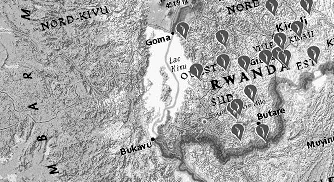
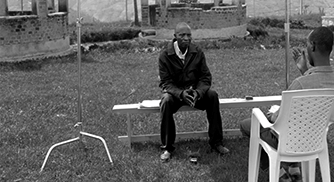
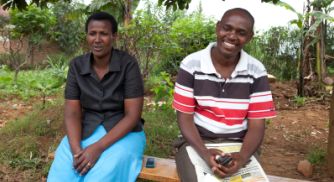
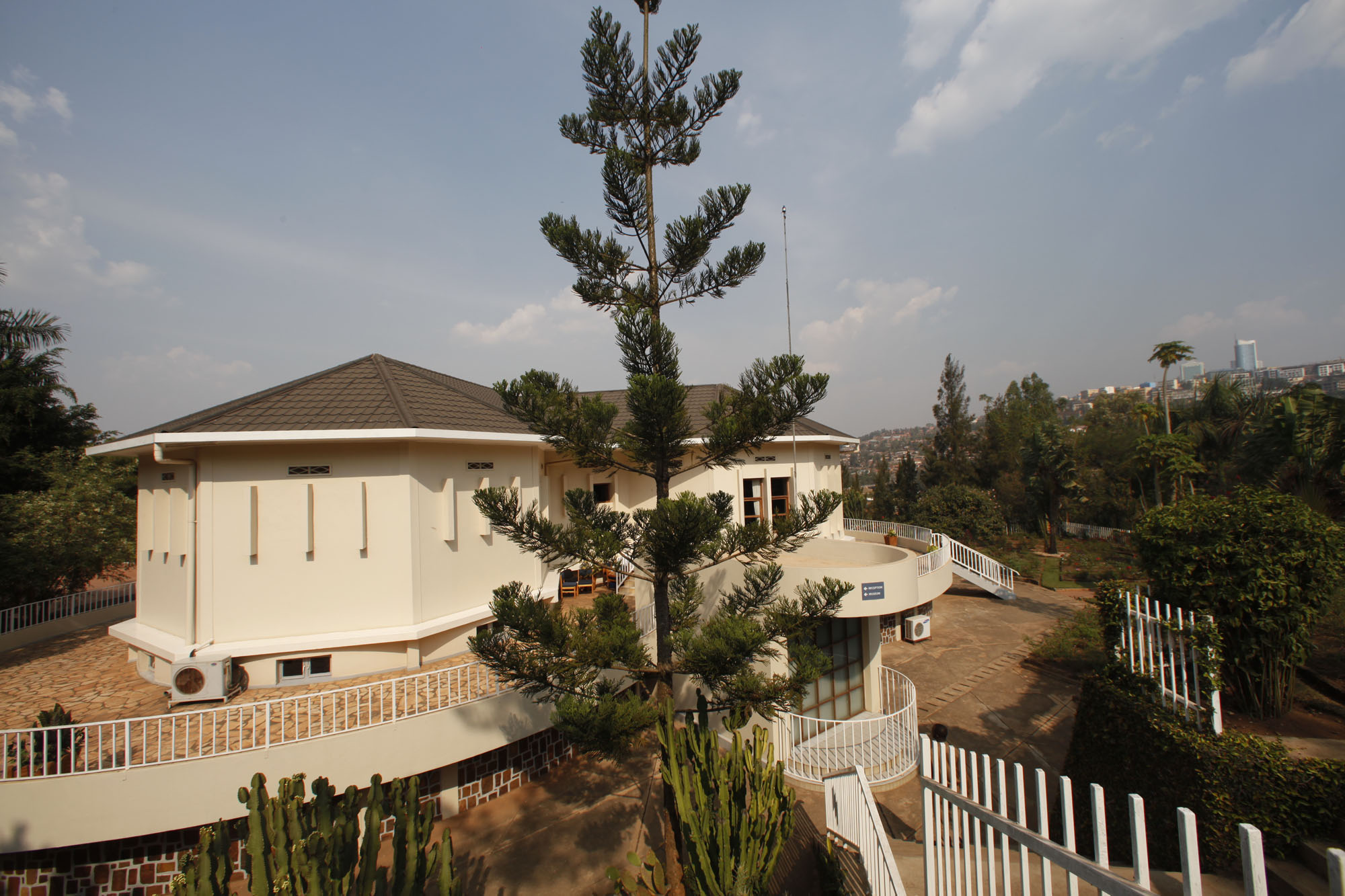
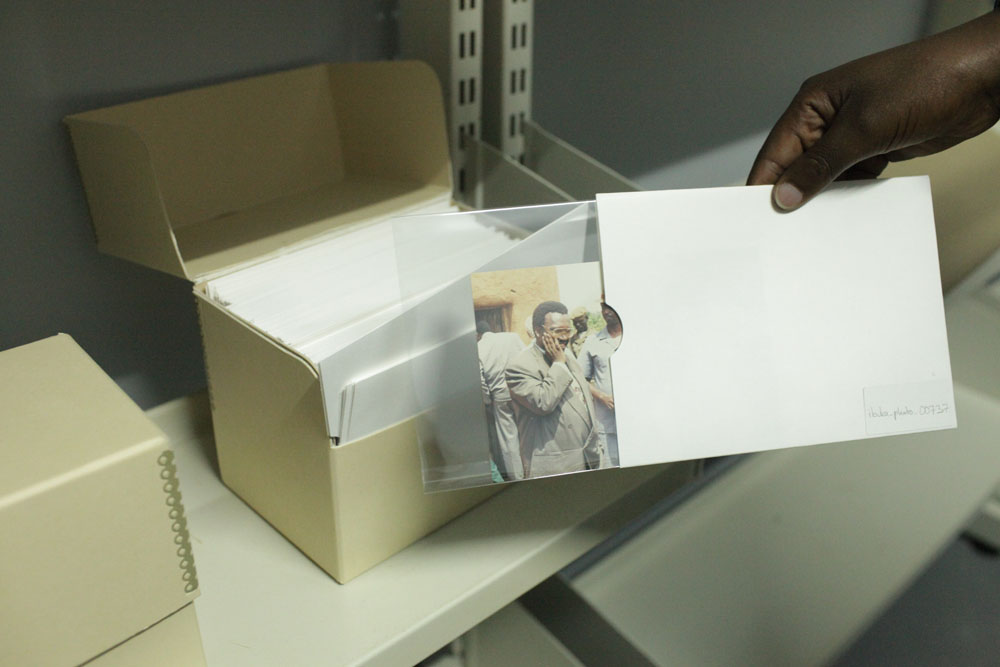
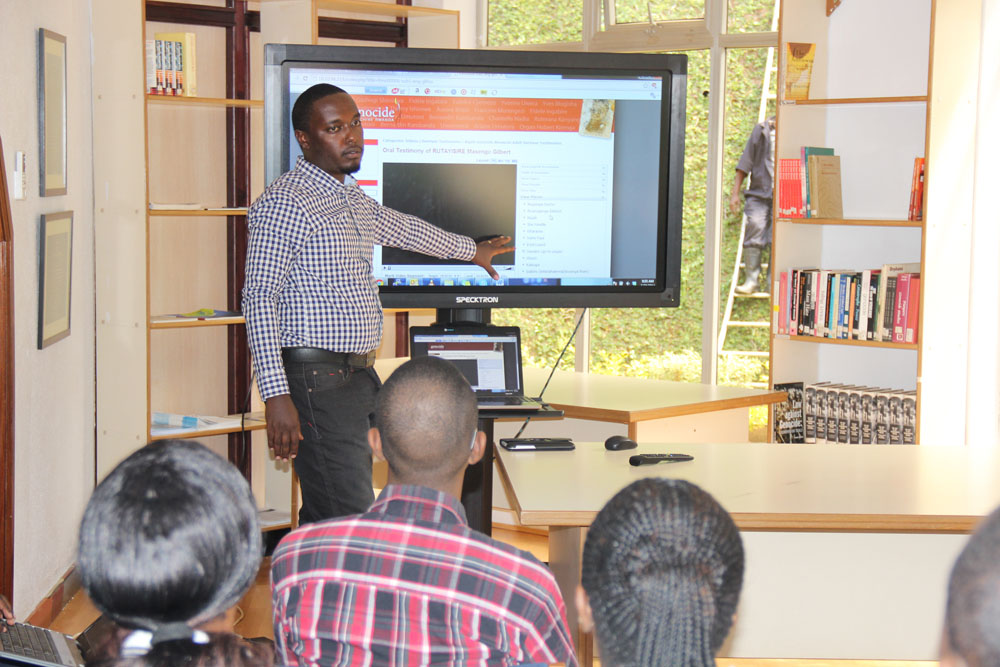
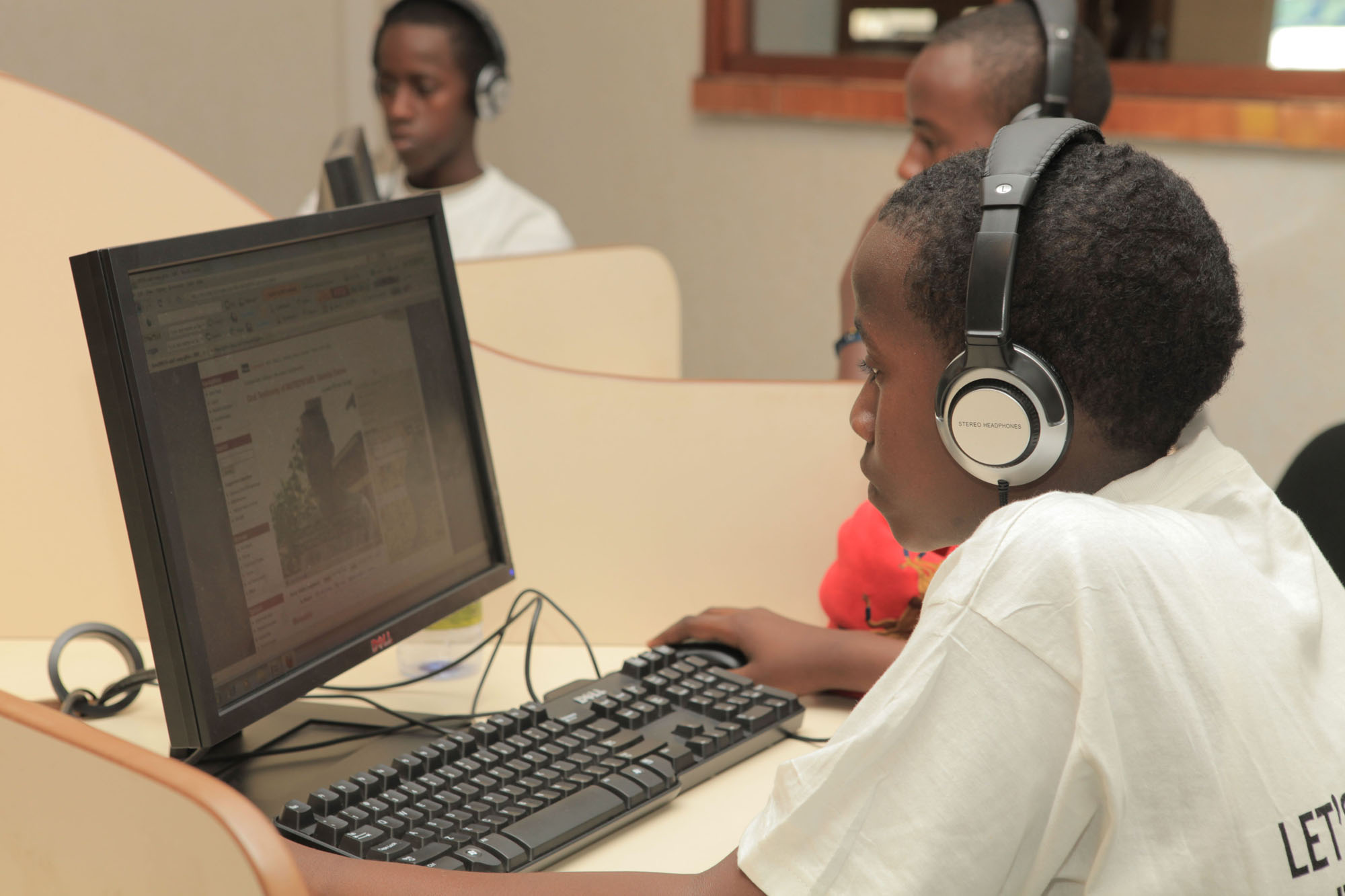
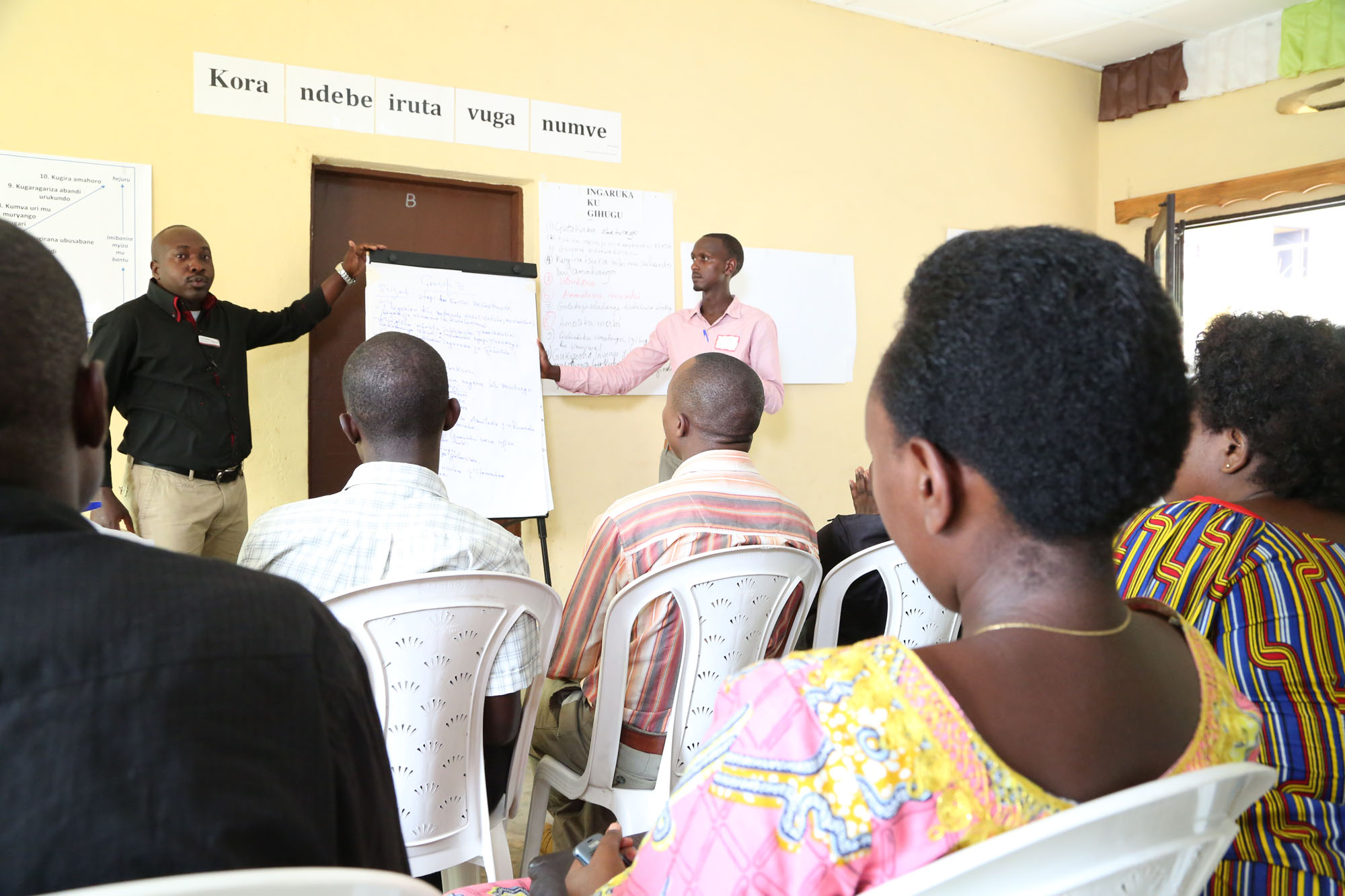
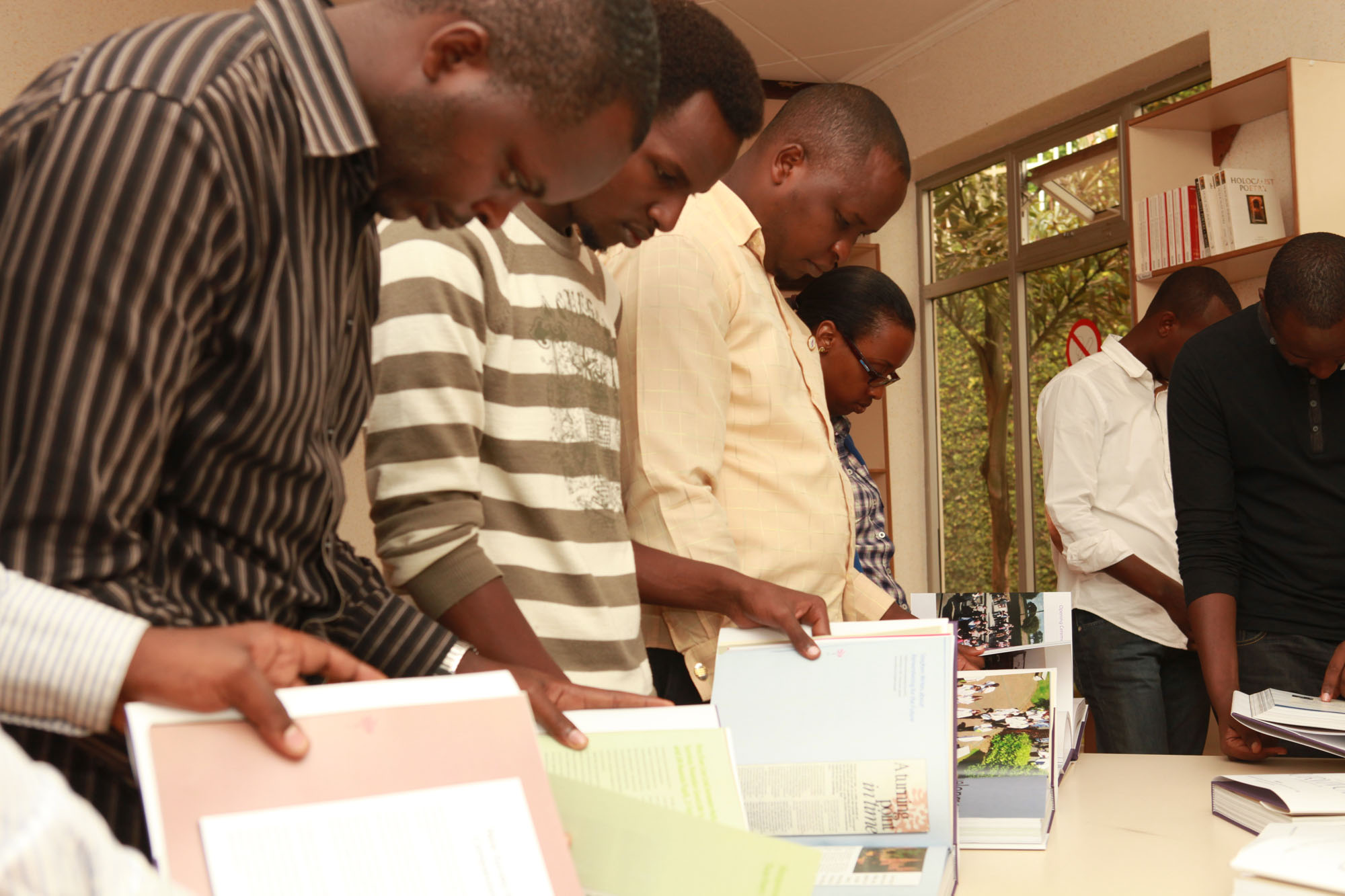




 Share this video
Share this video